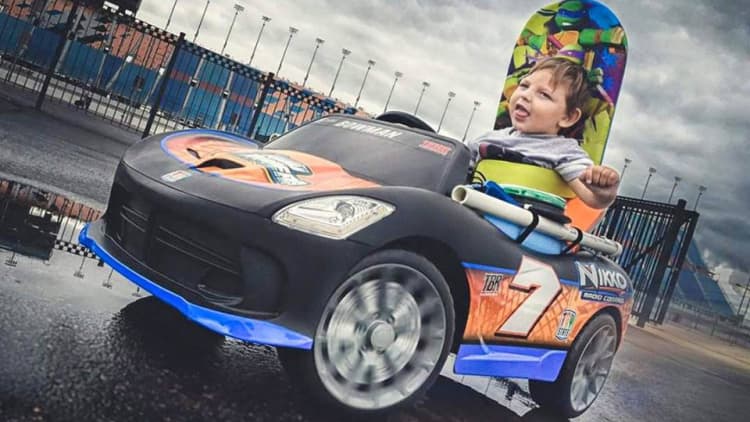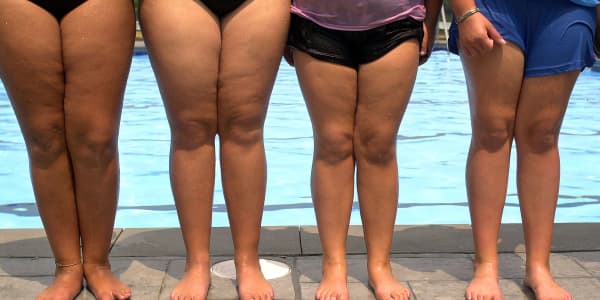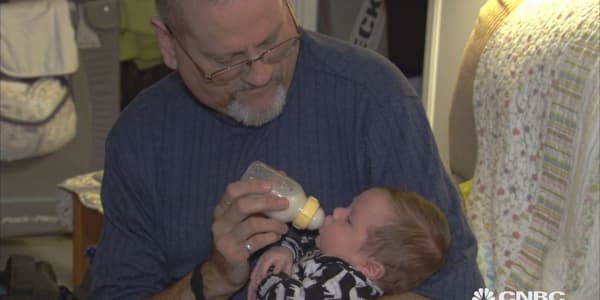
Six-year-old Paxton Padilla's mom, Suzanne, gets choked up when she talks about trying to create the best life possible for her son in spite of his mobility issues.
"Since he was born, he has an underlying genetic syndrome that they can't figure out what it is," she told CNBC. "He has a congenital heart defect that's pretty severe, and because of a lot of his neurological issues, he's non-ambulatory, so he can't walk, he can't talk ... he is limited in how he can interact with his environment around him."
Suzanne, though, remains hopeful. That's thanks in part to Dr. Cole Galloway, a professor in the department of physical therapy at the University of Delaware and the founder of GoBabyGo, an organization that modifies kids' toys, like Fisher-Price Power Wheels jeeps, so that children with even the most severe mobility issues can still use them.
"We make either mechanical modifications to help you sit stably and be ready to drive and/or electrical modifications where we give you a bigger switch. If you can't move anything but your head, that's cool. We'll put the switch behind you and you'll be able to hit it," said Dr. Galloway.
The idea came to Dr. Galloway after families had approached him following a presentation he had made involving robotics.
"We did a National Science Foundation study with robotics and saw that kids that were given mobile robots, driveable robots, had a bump in cognition," Dr. Galloway said. "It's part science, part social, part social justice all wrapped up in a way that people can get behind these kids."
Toymaker Fisher-Price's parent company, Mattel, is also getting behind the project.
The multibillion-dollar toymaker's support was something Dr. Galloway found surprising, considering he is essentially rigging Mattel's toys in order to build a new product suited for special-needs children.
More from Modern Medicine:
New prostate cancer tests aim to reduce the death rate
Antibiotics are becoming the David to the Goliath of 'Superbug' infections
Writing a prescription ... for a dose of electricity
Gary Collins, senior manager of design and engineering, Fisher-Price Power Wheels, told CNBC that the partnership with GoBabyGo means much more than just allowing Dr. Galloway to continue to do what he's doing.
"He wasn't hacking this for his own promotion; it was essentially allowing these children to play like any other children, and it's just amazing what it brings to these children," Collins said.
He wasn't hacking this for his own promotion; it was essentially allowing these children to play like any other children, and it's just amazing what it brings to these children.Gary Collinssenior manager of design and engineering, Fisher-Price Power Wheels
Fisher-Price donates vehicles to Dr. Galloway, including a lot of their jeeps, while also giving the doctor a first look at what the company is planning to design next.
"We do share our upcoming designs with Cole before they're released and launched to the public, so that he can start looking at ways that he can modify these toys for children with mobility issues," Collins said.
"Cole also will make suggestions to us during our design process, and if there's ever an opportunity for us to basically work in some of Cole's insight into the design of our product, we do that."
Sidney Mageot, whose son Arthur suffers from intractable epilepsy and had two surgeries in February that disconnected the left side of his brain, attended one of Dr. Galloway's workshops with Arthur, where parents and therapists learn to modify the toys on their own. Sidney witnessed Arthur riding around in a toy car made specifically for him, being able to actually control it as best as he could on his own, despite now being legally blind.
"He loves it. So yes, that makes me happy. Makes us happy," Sidney said.
Beyond giving parents a chance to see their child doing things others may take for granted, Alison Cernich, director of the National Center for Medical Rehabilitation Research at the National Institutes of Health, said Dr. Galloway's project is a game changer for the industry, especially from the rehabilitation perspective.
"He makes some cars that you have to stand up to power that car. Now if it's really hard for that kid to stand up like that in a therapy session but they really want to do it to the car, you've given them a motivation. That's key with kids," Cernich said. "What he's done is used play to get them to do the thing we want them to do."
GoBabyGo has also partnered with Permobil, a Swedish company that makes powered wheelchairs.
Permobil spokesman Martinus Rönnerman told CNBC that they officially started working with Dr. Galloway in 2014, culminating with his designing a pediatric wheelchair for the company that is currently in the development process. Rönnerman said the chair is unlike anything the company would typically design.
Jon Sintorn, CEO of Permobil, wrote in an email that Cole started with a toy and developed a device with seating and positioning as well as adapted controls. "It's toylike and bears no resemblance to wheelchairs; however; integrated in the design are the functions that enable the independence and subsequent development the kids need," Sintorn explained.
Dr. Galloway told CNBC that his ultimate goal is to combine the toy industry, medical research and assistive technology to lower costs, increase availability and inject creative designs (such as seen in the toy industry) for children with severe mobility challenges.





